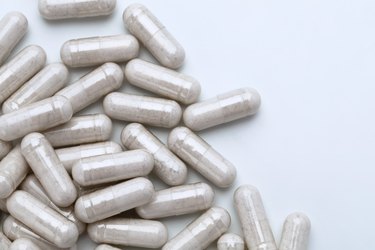
Probiotics are supposed to make you feel better, right? So, if you take probiotics, nausea or other uncomfortable symptoms may follow. You may be left scratching your head wondering why the probiotics are making you sick.
Tip
If probiotics make you sick, it's possible that you have an underlying issue, like SIBO, going on in your digestive system. It's also possible that you're taking contaminated probiotics, since there's very little regulation on the supplement industry.
Video of the Day
Sometimes, temporary symptoms are one of the signs the probiotics are working, but if you don't start feeling better after a week or so, you may have an underlying digestive issue. It could be small intestinal bacterial overgrowth (SIBO) that's making those probiotics work against you. Always talk to your doctor or a qualified nutritionist before you start taking probiotics to make sure they're right for you.
Video of the Day
What are Probiotics?
Probiotics are live microorganisms, usually bacteria and yeast, that are often called "good bacteria" because they provide health benefits to your entire body, according to Cleveland Clinic. Normally, there's a certain balance of these "good" bacteria and "bad" bacteria that can make you sick in your gut; but sometimes that balance can become disrupted by things like stress, poor diet or antibiotic use.
Probiotics can help you restore that balance by introducing the good bacteria back into your digestive tract so they can balance out the bad bacteria again. While this can make many people feel better, it can actually make you feel sick if you have a digestive condition called small intestinal bacterial overgrowth.
Probiotics and SIBO
After hearing reports of brain fog, gas and bloating associated with probiotic use, researchers set out to determine whether these were normal probiotics detox symptoms or if there was another underlying digestive issue going on.
In a small study that was published in Clinical and Translational Gastroenterology in June 2018, researchers reported that people who have SIBO, which is characterized by an overgrowth of bacteria in the small intestine, may get sick after taking probiotics.
That's because probiotics can add to the population of bacteria in the small intestine and make the problem worse. Some probiotics, like Lactobacillus and bifidobacterium, also create a byproduct called D-lactic acid, which can build up in those with SIBO and cause the characteristic brain fog.
Other symptoms that pointed to exacerbated SIBO from probiotic use included:
- Bloating and abdominal distention
- Abdominal pain/cramping
- Fatigue
- Restlessness
- Weakness
- Disorientation
- Excessive burping
- Diarrhea
- Headache
Read more: 7 Signs Your Gut Is Out of Whack
Illness from Probiotics
The National Center for Complementary and Integrative Health also notes that probiotics can cause an infection in people who have a compromised immune system or high-risk individuals, such as people who are hospitalized or just had surgery and premature infants.
A report that was published in Expert Opinion on Drug Safety in February 2014 pointed out that the most common types of infections associated with probiotic use are:
- Sepsis: a potentially life-threatening blood infection
- Fungemia: a fungal or yeast infection in the blood
- GI, or intestinal, ischemia: a blockage in the blood flow in the arteries that supply the intestines with blood
Again, these types of infections are typically only seen in critically ill or immune compromised individuals. Probiotics have been classified as extremely safe for the general population.
Probiotics and Nausea
Keep in mind that even if you're healthy and you don't have any underlying digestive issues, you may still go through some probiotics detox symptoms when you first start supplementing with the good bacteria.
The symptoms are usually mild and may include nausea, gas, abdominal pain and bloating. If you're taking a probiotic supplement, it's also possible that you may be sensitive to one of the other inactive ingredients in the supplement.
Read more: 12 Foods High in Probiotics for Better Gut Health
A May 2015 report in Clinical Infectious Diseases points out that the safety of any commercial probiotic supplement depends on both the probiotics and the other ingredients in it. That's why it's important to read labels carefully and avoid any known intolerances.
It's also a good idea to choose probiotic supplements that contain as few added ingredients as possible. That way, you can lower your risk of a reaction since there are fewer ingredients.
Although the exact strain and quantity of probiotics you need depends on why you're taking them (remember: talk to your doctor before starting probiotics, especially if you're taking any medications), Harvard Health Publishing recommends choosing one with five to 10 colony-forming units (or CFUs) and taking one capsule per day.
Read more: 14 Natural Remedies for Nausea
- National Center for Complementary and Integrative Health: "Probiotics: What You Need to Know"
- Clinical Infectious Diseases: "Risk and Safety of Probiotics"
- Expert Opinion on Drug Safety: "A Systematic Review of the Safety of Probiotics"
- Clinical and Translational Gastroenterology: "Brain Fogginess, Gas and Bloating: A Link Between Sibo, Probiotics and Metabolic Acidosis"
- Cleveland Clinic: "Probiotics"
- Johns Hopkins Medicine: "Small Intestinal Bacterial Overgrowth (SIBO)"
- Harvard Health Publishing: "Should You Take Probiotics?"
- MayoClinic.com; Probiotics: Important for a Healthy Diet?; Katherine Zeratsky, R.D., L.D.
- University of Maryland Medical Center; Lactobacillus Acidophilus; Steven D. Ehrlich, N.M.D.; 2009